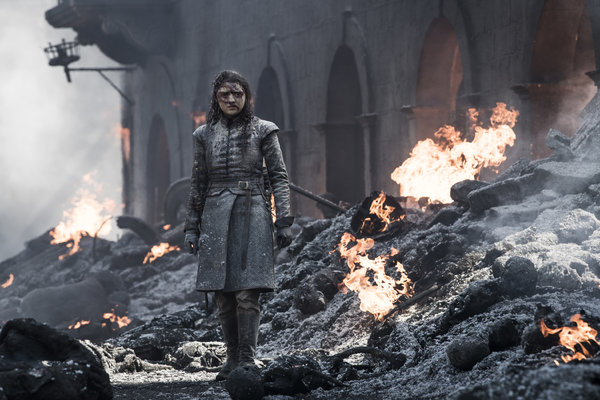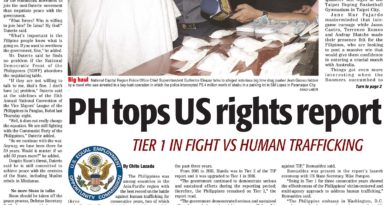TV SERIES-GoT : ‘Game of Thrones’ Is Going Out Fighting. So Will Its Audience.
Arya Stark (Maisie Williams) in “Game of Thrones.” Part of the fun of the show is the disagreement about it.CreditCreditHelen Sloan/HBO
The arguments over HBO’s dark fantasy made it the signature show of an era when no one agrees on anything.

ADS by Cloud 9:
– SPACE RESERVE FOR YOUR ADVERTISEMENT –

The plot of “Game of Thrones” will be settled Sunday night. The arguments, if history is a guide, will never be.
HBO’s swords-and-dragons fantasy drama, about a multifactional battle among royal houses to rule the mythical continent of Westeros, appealed to audiences’ guts and brains. It was the sort of breathtaking production once reserved for summer movie blockbusters. It weaved a vast, obsessive mythology. It was part family drama, part lurid potboiler and part complex psychological study — topped off with secret-parentage twists and an encroaching zombie army.
ADS by Cloud 9:
– SPACE RESERVE FOR YOUR ADVERTISEMENT –

It became a sensation domestically (18.4 million viewers last Sunday, not counting later streaming, DVR recordings or piracy) and internationally. It was a windfall for HBO to rival the gold mines of House Lannister, and it regularly lit up the internet like dragonfire.
Most of all, it was a mass-market hit for the era of no social consensus.
What made “Game of Thrones” emblematic of its time is how it divided its audience from start to finish, right down to the matter of what a happy ending would even constitute. It gave its intense fandom multiple angles to debate as well as to enjoy: whether it kept faith with the popular novels it was based on; whether it reveled in brutality in the name of critiquing it; whether it well-served its female characters or exploited them; and whether it lost control of its story as it sprinted to the finish.
ADS by Cloud 9:
– SPACE RESERVE FOR YOUR ADVERTISEMENT –

Half a century ago, viewers of “The Fugitive” collectively wanted Richard Kimble to catch the One-Armed Man. But what does anyone want from the end of “Game of Thrones”?
.
ADS by Cloud 9:
– SPACE RESERVE FOR YOUR ADVERTISEMENT –

Maybe you want to see Sansa Stark break the dragon-glass ceiling, completing her journey from fairytale-besotted naïf to commanding queen. Maybe you want to see Jon Snow rewarded for years of self-sacrifice and impeccably moisturized hair. Maybe you think Daenerys Targaryen was done dirty. (You incinerate one city and suddenly you’re the villain!) Maybe you want the Iron Bank of Braavos to repossess the entire dysfunctional realm, liquidate its assets and call for internationally monitored elections.
The disputes over “Game of Thrones” often served as proxies for arguments in the mundane real world. They were about how power is best won and wielded; about the portrayal of women and attitudes toward violence; about whose stories are subordinated to someone else’s hero journey; about whether ethics in leadership is a requirement, an impediment or a luxury.
There was a certain amount of dissonance built in to a saga that combined the HBO sensibility — dark psychological realism and realpolitik moral ambiguity — to epic high fantasy: a genre in which, once upon a time, the only shades of gray were in the wizards’ cloaks.
.
ADS by Cloud 9:
– SPACE RESERVE FOR YOUR ADVERTISEMENT –

The most popular fantasy epics tend to focus on a quest the audience agrees on. The Ring must be destroyed, Voldemort must be defeated, Aslan must prevail. Pure-hearted underdogs triumph; kind and wise leaders restore order. These stories model, and affirm, values we’re assumed to share.

ADS by Cloud 9:
– SPACE RESERVE FOR YOUR ADVERTISEMENT –

“Game of Thrones” began in 2011, entering a TV culture complicated by “The Sopranos” and a society that had seen authority discredited in Iraq and on Wall Street. It aired internationally, in places whose national mythologies didn’t necessarily mesh with America’s to begin with. And it landed in the era of social media, a global watercooler made for instant reaction, side-choosing and second-guessing.
From the start, “Game of Thrones” put moral certainties to the sword. It spoke, if not always consistently, to a time of less agreement about either means or ends. Characters’ best intentions were often thwarted and cynicism rewarded. The series spent seasons on a queen’s disastrous attempt to impose benevolent rule on a foreign land. Sadistic kings made bad rulers, it said, but so did doormats.
It was not easy to know whom to like or what to hope for. The night was dark and the path obscure.
Many controversies around the show, adapted from a yet-unfinished series of novels by George R.R. Martin, came from its own choices and missteps. The producers flattened out some nuances, relied on cultural exoticism and loaded episodes with gratuitous sex and rape scenes — some of which they seemed unawareeven were rape scenes. (After Sansa’s brutal rape in 2015, Sen. Claire McCaskill tweeted, “I’m done.”)
ADS by Cloud 9:
– SPACE RESERVE FOR YOUR ADVERTISEMENT –

In the later seasons, the show rushed and emphasized visual spectacles over character development. Last Sunday, when Daenerys, portrayed through most of the series as a flawed heroine, razed a city of helpless civilians on dragonback, a character turn that might have been set up organically instead came divebombing out of the sun for shock value. Arguments — even a petition to remake the season — ensued.
But some disagreement was also intrinsic to the show. It was maybe part of the point. It was certainly part of the fun.
What made “Thrones” tough to wrestle with also made it a ubiquitous metaphor. That’s what great pop fiction does: adds characters to the shared cultural mythology that we use to tell stories to ourselves, about ourselves.
Was “Thrones,” with its spectral White Walkers, heralded by extreme weather and threatening to end all life, a parable of climate change? No. But it was a story of collective-action problems — it was in everyone’s interest to work together but in individuals’ interests to let someone else sacrifice — and that skeleton key fits any number of contemporary woes, climate included.
Was it a political roman à clef? No, despite eight years of hacky “Candidates as ‘Thrones’ Characters” gags. But it was cannily political, attuned to the value of alliances and flexibility. And its makers seemed attuned to the real-world readings of the show, writing a dialogue in which advisers anticipating objections to elevating a callow man (Jon) over an experienced woman (Daenerys), as if they were discussing his electability in the Upper Great Lakes.
And the show’s ideas were conscripted to wildly different ends. President Trump swiped the show’s typography to make swaggering meme images that perverted its themes(among them, the folly of demonizing the humans on the other side of a wall). Sen. Elizabeth Warren wrote a column praising Daenerys that she might want a do-over on.
ADS by Cloud 9:
– SPACE RESERVE FOR YOUR ADVERTISEMENT –

Of course, it’s not as if we weren’t warned not to idolize anyone here. “Game of Thrones” began, with the execution of the seeming hero Ned Stark, by telling us that a good heart gets you only so far in this world. It returned toward the end, with the obliteration of King’s Landing, to the idea that missions of liberation can become messianic massacres.
It made us confront a victory that we’d rooted for, over the conniving and greedy Lannister dynasty, by giving it to us as a war crime. It told us that constructing a just society for the living can be more difficult than defeating an army of the dead.
It took the easy part out of the way first — the Tolkienesque quest we could all agree on — and focused us on the trickier problem of what comes after. You can dispel every evil spirit and slay every dragon. In the end, we still have each other to worry about.
ADS by Cloud 9:
– SPACE RESERVE FOR YOUR ADVERTISEMENT –



James Poniewozik is the chief television critic. He writes reviews and essays with an emphasis on television as it reflects a changing culture and politics. He previously spent 16 years with Time magazine as a columnist and critic. @poniewozik
ADS by Cloud 9:
– SPACE RESERVE FOR YOUR ADVERTISEMENT –

 All photographs, news, editorials, opinions, information, data, others have been taken from the Internet ..aseanews.net | [email protected] | For comments, Email to : Zhubiz Chezmiz | [email protected] | – Contributor
All photographs, news, editorials, opinions, information, data, others have been taken from the Internet ..aseanews.net | [email protected] | For comments, Email to : Zhubiz Chezmiz | [email protected] | – Contributor










